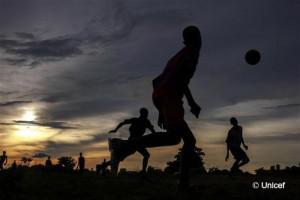Inheriting HIV: A bitter pill to swallow


Sibusiso Soko* is 17 years old and lives with his siblings, cousins and grandparents in Ermelo, Mpumalanga.
He is the only one of his siblings to inherit HIV from his mother, who died from AIDS-related illnesses when he was young.
After what he says was a childhood punctuated by frequent illness, Soko is currently on antiretrovirals (ARVs).
“I have been living with HIV for as long as I can remember,” he tells OurHealth. “I was always sick when I was growing and this meant I spent many days in and out of hospitals.”
“I often had to miss school,” he adds.
Soko was born when South Africa had not yet introduced HIV treatment or prevention of mother-to-child HIV transmission services. Due to government’s delays in providing ARVs, about 35,000 children were born with HIV between 2000 and 2005, according to studies by the US Harvard University.
[quote float=”right”]”It’s hard for me to accept that I am HIV-positive not because of something that I did, but because of something that happened to my mother”
While the country has managed to radically reduce the amount of children born with HIV through prevention of mother-to-child HIV transmission services, about three percent of children born to HIV-positive mums still contract the virus within the first year of life.
To prevent possibly transmitting the virus to their babies, pregnant women are encouraged to be tested for HIV at their first antenatal clinic visit. If a woman tests HIV-positive, she should be started on the country’s new three-in-one ARV that same day, according to national guidelines. Women will continue taking the daily fixed-dose combination ARV at least until they finish breastfeeding.
According to UNAIDS’ latest figures, 410,000 children in South Africa are living with HIV.
Some days are better than others
While his family supports him, Soko says he still struggles to accept his HIV status – especially when many people still associate having HIV with risky behavours like having multiple concurrent sexual partners or injecting drugs.
“I never did any of these things,” he says. “It’s hard for me to accept that I am HIV-positive not because of something that I did, but because of something that happened to my mother, who in turn transmitted the infection to me.”
“I try to live a positive lifestyle, but I don’t understand why I am HIV-positive,” he admits.
He does not tell people at school that he is HIV-positive because he says he is afraid of how they might react.
“It’s difficult,” he says. “I want to be cool like every other teenager, but it’s difficult to be cool when you are living with a chronic illness.”
Some days are better than others and some days are terrible, he says.
“Sometimes it gets so hard, I even struggle to take my treatment,” he adds.
Soko is not alone. Reviewing project data from four countries, international humanitarian organisation Medicines Sans Frontières found that children and teenagers on ARVs like Soko were more likely than adults to have higher amounts of HIV in their blood.
Detected with HIV viral load testing, these increased HIV levels may mean that children and teens face more challenges in adhering to daily ARV treatment.
*Name changed to protect the child
An edited version of this story was originally published by Mpumalanga’s local Khanyisa Media.
Author
Republish this article
This work is licensed under a Creative Commons Attribution-NoDerivatives 4.0 International License.
Unless otherwise noted, you can republish our articles for free under a Creative Commons license. Here’s what you need to know:
You have to credit Health-e News. In the byline, we prefer “Author Name, Publication.” At the top of the text of your story, include a line that reads: “This story was originally published by Health-e News.” You must link the word “Health-e News” to the original URL of the story.
You must include all of the links from our story, including our newsletter sign up link.
If you use canonical metadata, please use the Health-e News URL. For more information about canonical metadata, click here.
You can’t edit our material, except to reflect relative changes in time, location and editorial style. (For example, “yesterday” can be changed to “last week”)
You have no rights to sell, license, syndicate, or otherwise represent yourself as the authorized owner of our material to any third parties. This means that you cannot actively publish or submit our work for syndication to third party platforms or apps like Apple News or Google News. Health-e News understands that publishers cannot fully control when certain third parties automatically summarise or crawl content from publishers’ own sites.
You can’t republish our material wholesale, or automatically; you need to select stories to be republished individually.
If you share republished stories on social media, we’d appreciate being tagged in your posts. You can find us on Twitter @HealthENews, Instagram @healthenews, and Facebook Health-e News Service.
You can grab HTML code for our stories easily. Click on the Creative Commons logo on our stories. You’ll find it with the other share buttons.
If you have any other questions, contact info@health-e.org.za.
Inheriting HIV: A bitter pill to swallow
by senamilephungula, Health-e News
July 3, 2014



